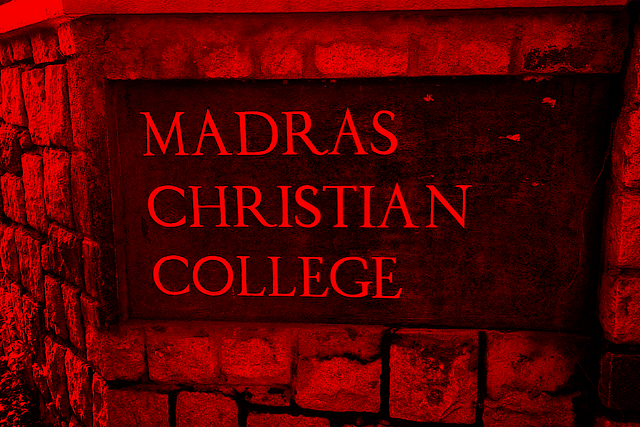
Why Madras High Court Is Right In Observing That Christian Institutions Are Unsafe For Girl Children
Reported cases of sexual abuses in Christian institutions are only a handful with several cases having gone unreported due to fear of the authority, political patronage or the helplessness of victims.
When Justice Vaidyanathan said that Christian institutions have become “highly unsafe for girl children”, he was reflecting the anguish of many silent parents.
Last week, an observation by Justice S Vaidyanathan of the Madras High Court, while hearing a petition from an assistant professor of Madras Christian College (MCC), on the safety of Christian institutions for girl students in Tamil Nadu, caused a flutter in the state.
The judge made the remarks when MCC Assistant Professor Samuel Tennyson moved the High Court to quash a show cause notice issued to him on charges of sexually harassing at least 34 girl students.
The students were studying zoology in the college and were in the final year of their undergraduate course.
The show cause notice was issued after an internal complaints committee of the college found substance in students’ complaints of sexual harassment during an academic tour to Bengaluru, Mysuru and Kodagu in January this year.
Quashing Tennyson’s plea, the judge said that though Christian institutions “impart good education, their preaching of morality will be a million-dollar question.” He said Christian institutions have become “highly unsafe for girl children”.
Justice Vaidyanathan’s remark has drawn reactions in favour and against.
However, his observations are not out of place if one were to look at some of the past records of some Christian institutions in Tamil Nadu.
In August last year, Chennai Police arrested four people under the Protection of Children from Sexual Offences (POCSO) Act for sexually harassing children of an orphanage run by a Christian organisation. The arrest and filing of cases followed complaints from the girls of the orphanage.
In June last year, a case under POCSO Act was filed against 63-year-old Rev Guna Jothimani or Gunajyothi, correspondent and hostel warden of Methodist School at Uraiyur near Trichy, for sexually abusing a girl studying in Class IX.
Initially, the police refused to entertain a complaint from the victim’s family but as the information spread, the correspondent himself surrendered in the additional magistrate court, Trichy.
Later, he was let out on bail though the judge said that allegations against him were serious.
A more famous abuse case was that of a girl student from a Christian institution in Salem. The body of the Dalit girl, Suganya, was found in a well near the Omalur Fathima Girls Higher Secondary School near Salem in 2006. Blood, broken bangles were found along with condoms and liquor bottles from the school premises resulting in the people suspecting involvement of some school authorities in the student’s death.
The then Bishop of Salem rejected a request from the ruling Dravida Munnetra Kazhagam minister to transfer the staff to pacify the restless public. Forensic tests later revealed that the girl had been sexually molested.
A priest, who was a suspect in the case, was asked to undergo medical tests but nothing much has been heard after that. The culprits are still free.
A year later, a girl was reported to have committed suicide in Cuddalore St Anne’s Girls Higher Secondary School hostel. The family of the girl, Ananthavalli, suspected foul play. Local media reported that the girl’s mouth was found stuffed with cloth and a bunch of her hair was found a little away. However, nothing happened in this case.
In 2008, a Catholic priest was found murdered in his hostel room of a pilgrim centre in Tamil Nadu. Subsequent investigations by the Tamil media revealed that he was part of a network that abused girls in orphanages.
In September 2015, 17-year-old girl Sivasakthi, studying in Class XII at the Little Flower Roman Catholic School for Girls at Chinna Salem in Kallakurichi district, was found hanging. The girl belonged to the Schedule Caste community and foul play was suspected behind her death, but the school authorities said she committed suicide as she had fared poorly in mathematics.
These are cases that have come to light.
There are some cases like that of Rathinam Rajarathinam, a priest and president of St Joseph’s College Trichy, that was kept a secret for over a decade before they became public in recent months. Rajarathinam raped and impregnated a nun, who was pursuing a master’s degree in the college.
The priest continuously threatened and abused her between 2006 and 2008 leading to her pregnancy in 2008. The pregnancy was terminated and she was expelled from the church. The nun’s case was taken up by the college rector Susai Pitchai but he was found dead in 2010. Police said Susai Pitchai died of a heart attack.
Police filed a case against Rajarathinam for abusing the nun but he got a bail from the Madras High Court in November 2010. He is now the secretary of the Loyola College at Vettalam in Thiruvannamalai district. The case against him is still pending in a court specially set up to deal with cases of women abuses.
Reported cases of sexual abuses in such institutions are only a handful. There are many cases that have gone unreported either due to fear of the authority, political patronage or the victim feeling helpless against powerful authorities.
The case against MCC Assistant Professor Tennyson, therefore, isn’t something to be dismissed off lightly. He has been accused of sexual misconduct by at least 34 girl students.
Justice Vaidyanathan has only reflected the anguish of many silent parents, who according to him, generally feel that co-educational study in Christian institutions is “highly unsafe for the future of their children”, especially female students.
In reflecting the concerns of thousands of such parents, his observations seem justified.